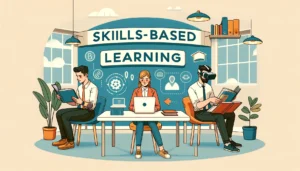The age of the Talentsumer: why employees are now the consumers of work
- 5 Min Read
The way we think about work is changing rapidly. Stability, structure and ‘a job for life’ are becoming obsolete concepts, Bruce Morton, Head of Strategy, Allegis Global Solutions and talent acquisition expert, explains further.
- Author: Bruce Morton
- Date published: May 2, 2019
- Categories

A generational shift in the workforce and a change in conditions means that today’s workers have different expectations, desires and values than their predecessors. Today’s ‘Talentsumers’ are a product of the modern consumer-friendly atmosphere, where people have grown to expect workplace responsiveness to their needs, and the same level of respect and attention back. Today’s freelancers, employees, contractors and job candidates enjoyed more flexibility and open communication from their parents compared with earlier generations – and they project these desires onto potential employers.
Modern workers face higher expectations and expenses, shorter tenures and less job stability – but potentially longer lives than those who came before them. Because of this, Talentsumers have a list of urgent demands that they need employers to meet:
- Build skills and expand the types of work they can take on
- Enjoy a flexible hiring status and work hours
- Receive frequent feedback and coaching from inspiring leaders
- Work on projects with a start and end—not BAU
- Receive continuous training, development and visible paths toward promotion
Respondents to our recent survey saw four areas to be the greatest concern to those looking to find work:
- The developmental opportunities offered
- Whether they provide ongoing feedback and coaching from managers
- Collaboration encouraged among employees
- Rewarding and recognizing high performance
Workers in other age groups saw the benefits of these conditions, so of course, Talentsumers want them too. Now, the key people that employers pursue are Talentsumers. They want to be offered ways to enrich their lives, and in return, they will contribute to the overall culture of the company, and the ultimate success of the business. Everyone wins!
Let’s look at why these things have become important in up-and-coming generations.
Consider the world Talentsumers inhabit – the human population will continue to grow (barring a cataclysm), and so will the competition for resources and work that provides for them. Climate change will result in more competition for organic resources, and the rural-to-urban trend will leave fewer jobs in outlying areas, and more in cities. Yet employers may still not be able to fully staff from local pools – so travel or remote work will increase. Since the employment scene will be volatile, job stability will continue to degrade from the thirty-years-and-a-gold-watch standard than it already has.
At the same time, according to the Human Mortality Database, people will be living longer lives. Half of all babies born from this point onward in developed nations are expected to live past one hundred years. However, we continue to pursue our working lives as our parents and grandparents have done—enjoying a single major career path to a certain age, say sixty-two or sixty-five, and then retiring on money previously saved and invested. But not many people in current and future generations will be able to afford retirement barely halfway through their lives – so how many will be forced to change jobs or careers many times and start over building skills, income, and future plans?
Talentsumers are looking to appeal to a variety of employers in more than one niche. They want to associate with companies that will provide training and education, and support for the work they are doing. They seek real opportunities to push themselves and develop new skills and interests.
Job candidates and employees want to have the opportunity to guide their working lives into new territory – and they’re serious about it. If they’re with you now, they want the tools to perform a cost-benefit analysis of how their investment in you is paying off. If they’re considering joining your team, they’ll want information at their disposal to help them gauge the potential relationship, on their terms. Think about how you can answer the big questions that will help them plot the return on their investment, such as:
- How easy is it to achieve what I want?
- How challenging, rewarding, and exciting does the work remain?
- How much personal success do I achieve—however I choose to define success?
- How easy is it for me to achieve what you ask?
- How much of my time is spent doing great and important work?
- How much and how fast can I learn?
- How well, or poorly, do you use the assets I provide?
None of these are ‘new’ human desires. They are simply louder iterations of fundamental needs that are intrinsic to our nature. Plenty of business leaders are heard lauding the work of Daniel Pink – a business writer who determined that autonomy, mastery, and purpose are all elements that motivate, fulfill and engage workers. We want to think that our organizations provide opportunities in those areas, but how accessible are they? Is it easy for employees to structure their work days (autonomy), excel in their roles (mastery) and contribute to something larger than just deadlines and quotas (purpose)? And how do we make it easy for employees to do their jobs really well, amidst all of this?
The shift in younger-generation employees is a natural extension of the work/life balance debate. The majority of people now are always connected, and therefore always have work on their minds. Therefore, they feel that there is no separation of work and life.
This is how the movement towards creating holistic and satisfying company cultures started. Great culture helps businesses financially and this trickles down to employees – but today’s workers understand that they contribute personal as well as professional gifts to their employment. Therefore, the equation demands that they receive a measure of their personal satisfaction as well.
Bruce Morton, Workforce Design and Talent Acquisition Expert and author of Redesigning the Way Work Works, available on Amazon









